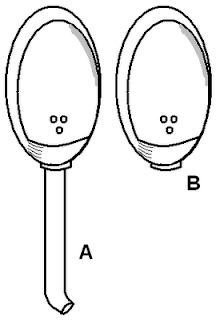I had just begun lunch when they called me to the OT.
"Sir, please come to the OT. There is a cyst in the uterus" my House Officer told me.
I knew they were operating on a 42 years old woman with uterine leiomyomas and infertility. They were doing removal of a couple of small leiomyomas (seen on ultrasonography) because the woman had uncontrollable dysmenorrhea. They were also checking tubal patency for her infertility.
"It must be cystic degeneration in a leiomyoma" I said.
"Sir, it is different" she said. "Please come and have a look."
I packed away my unfinished lunch and went to have a look.
The uterus was open on the left of its posterior wall. A cystic structure was seen inside.
"She had menses two weeks ago, but the flow was scanty this time" the operating surgeon told me. "It looks like a pregnancy, which must have been there when she bled. Shall I close the uterus and let the pregnancy have a chance to continue?"
"But where is the leiomyoma?" I asked. "You were going to make an incision over the leiomyoma you palpated when I went for lunch."
"...."
"I will wash up and have a look" I said. "Don't do anything until I come."
While I was washing up, I suddenly remembered they had put a Foley's catheter in the uterine cavity for chromopertubation. Perhaps this was the balloon of the catheter. I rushed back to the OT.
"Deflate the balloon of the catheter and see if the 'cyst' goes away" I said. A House Officer did that and the 'cyst' disappeared. Comprehension dawned on everyone.
"What you called a leiomyoma was the balloon of the catheter" I said. "She has just one leiomyoma which she had two years ago when we performed a laparoscopy on her. Now she has adenomyosis too, which is causing all that pain." I pointed out the uniform enlargement of the uterus and three endometiosis-like nodules under the fundal serosa. "She won't be cured by anything other than hysterectomy." We had discussed the option of hysterectomy with the patient preoperatively, and she had consented for it if it was deemed necessary. A hysterectomy was duly performed. The specimen showed adenomyosis. She made an uneventful recovery.
I don't think I have to write down the morals of the story.
"Sir, please come to the OT. There is a cyst in the uterus" my House Officer told me.
I knew they were operating on a 42 years old woman with uterine leiomyomas and infertility. They were doing removal of a couple of small leiomyomas (seen on ultrasonography) because the woman had uncontrollable dysmenorrhea. They were also checking tubal patency for her infertility.
"It must be cystic degeneration in a leiomyoma" I said.
"Sir, it is different" she said. "Please come and have a look."
I packed away my unfinished lunch and went to have a look.
The uterus was open on the left of its posterior wall. A cystic structure was seen inside.
"She had menses two weeks ago, but the flow was scanty this time" the operating surgeon told me. "It looks like a pregnancy, which must have been there when she bled. Shall I close the uterus and let the pregnancy have a chance to continue?"
"But where is the leiomyoma?" I asked. "You were going to make an incision over the leiomyoma you palpated when I went for lunch."
"...."
"I will wash up and have a look" I said. "Don't do anything until I come."
While I was washing up, I suddenly remembered they had put a Foley's catheter in the uterine cavity for chromopertubation. Perhaps this was the balloon of the catheter. I rushed back to the OT.
"Deflate the balloon of the catheter and see if the 'cyst' goes away" I said. A House Officer did that and the 'cyst' disappeared. Comprehension dawned on everyone.
"What you called a leiomyoma was the balloon of the catheter" I said. "She has just one leiomyoma which she had two years ago when we performed a laparoscopy on her. Now she has adenomyosis too, which is causing all that pain." I pointed out the uniform enlargement of the uterus and three endometiosis-like nodules under the fundal serosa. "She won't be cured by anything other than hysterectomy." We had discussed the option of hysterectomy with the patient preoperatively, and she had consented for it if it was deemed necessary. A hysterectomy was duly performed. The specimen showed adenomyosis. She made an uneventful recovery.
I don't think I have to write down the morals of the story.



